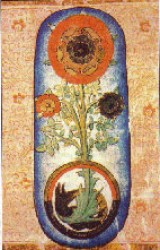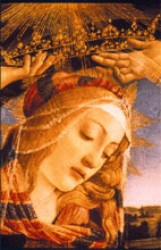|
|
|
| Two Gods or Two Principles? |
 Since God is infinite Spirit, He is thus absolutely Unique! Since God is infinite Spirit, He is thus absolutely Unique!
How can we be accused to support that God has two Sons and that we worship two Gods?
It is an awful slander! God has a Son, consubstantial, co-eternal and necessarily unique but subordinated, because He is the Son.
We recognize two principles in God. But those principles are secondary. Far from being gods, they are only 'aspects', two 'agents' of creation. Moreover, the second is negative, a ghost, the shadow of 'non-being', the obscure radiation of nothingness.
|
 Talk to us about the Son, the visible God! Talk to us about the Son, the visible God!
John the Apostle says about Him: ‘He is the Word, He is in God, He is God.’
He is the Creator God. ‘Everything has been done by Him.’
He is the Redeeming God, because the Word has become flesh and has lived among men.
The Redeemer is the same as the creator, for to make a world anew, one must have first created it.
Is Christ born of the virgin Mary?
Luke and Matthew say so. Mark remains silent. John says he was born in the bosom of God.
Matthew ties his genealogy to Abraham. Luke, his human genealogy to Adam.
John, his celestial genealogy to God. Only John has seen his eternal origin.
Like Aurora in Hellenistic wisdom, He sprang forth from the divine thought.
In the Orient, the Spirit is a feminine principle.
‘He was not born of a woman. He came through the Golden Door of Heaven.’
In the Eastern Church before the Council of Nicea, the mother of Christ was not human but celestial!
She was not called Mary, but ‘Mani’, ‘Mens’, ‘Manas’, which means ‘Thought’, Spirit.
Christ is a ray of the divine Thought that the Word manifests among men.
He came from above with the beauty of an immortal, the brightness of the dawn.
|
|
|
|
|




